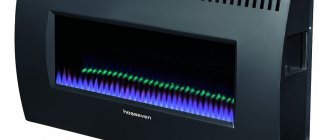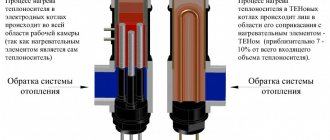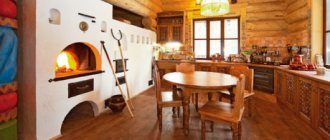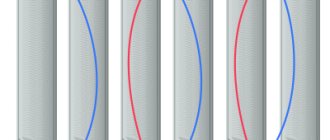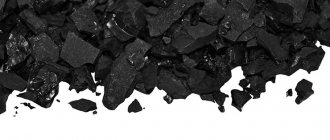Advantages and disadvantages of diesel heating boilers
Diesel heating boilers have many positive qualities, thanks to which they have earned good reviews from many consumers.
- Autonomy - the functioning of the heating system does not depend on the main gas supply or the power supply of the house. The main thing is to stock up on enough fuel.
- Durability - diesel boilers have an average service life of 40-50 years.
- The products have a high-quality insulated body. which ensures the safety of their use.
- High efficiency - diesel boilers provide high heat transfer in a short time, therefore they can quickly heat even large rooms.
- Additional heated burners used in modern models provide economical fuel consumption.
- All boilers have an easy-to-use control system.
- Most models can run on both diesel fuel and other fuels.
- Availability - the installation of a diesel boiler does not require special permission and can be done independently.
However, diesel heating boilers also have certain disadvantages. which, for some consumers, may negate all the available benefits.
- Installation of a heating system using a diesel boiler is very expensive. since, in addition to the purchase of direct equipment, the purchase of tanks for storing fuel, the purchase of a certain amount of combustible material, the equipment of a separate room, etc. is required.
- The high cost of the fuel used will make the use of a diesel boiler for heating small rooms irrational.
- A diesel boiler requires constant maintenance and periodic cleaning. otherwise, the soot generated after fuel combustion can clog the mechanism and interfere with the normal operation of the device.
- Boilers equipped with an automatic regulation system operate from the mains, therefore, in the event of a power failure, the use of the automation function will become impossible.
Advantages and disadvantages of diesel heaters
A diesel heating boiler has a number of significant advantages, so many property owners prefer installing a heating system of this type:
- the equipment is distinguished by significant power and with its help it is possible to heat rooms of a large area without problems, which is confirmed by a sufficiently high efficiency;
- fuel for such units can be purchased without problems - it is affordable and inexpensive compared to electricity;
- ease of maintenance;
- modern diesel-fueled heat generators have automatic control systems that allow you to control the heating process in accordance with the specified parameters;
- there is an opportunity to regulate the temperature of the coolant, and hence the temperature regime in the living quarters and utility rooms;
- automatic control one hundred percent ensures compliance with the norms and requirements regarding the implementation of fire safety rules.
In addition to its advantages, a diesel-fueled heat generator has a number of disadvantages:
- boilers for this type of heat source require a separate building (boiler room). In most cases, oil boilers are sold in floor-standing design. All the necessary conditions will be provided in the boiler room, specially equipped with ventilation and extractor hood;
- to store diesel fuel for heating, a special container is required. It must be kept in a separate room, which must be equipped in accordance with fire safety standards.It is connected to the heat generator using separate pipes;
- when the unit is operating, the burner makes noise, which is another reason for arranging a separate building for it;
- a working diesel heater is insignificant, but depends on an uninterrupted supply of electrical energy. If it is absent, the boiler stops working;
- at an ambient temperature below 5 degrees Celsius, diesel fuel tends to become thicker and it moves through pipes much more slowly. This consistency of fuel often clogs filters, and besides that, diesel fuel stops burning. Eliminate the drawback by insulating the pipeline and filter, but heating them is the best option. The optimal solution is heating the room where the fuel is stored.
Calculation of the amount of fuel for a month and a season
To find out which diesel boiler is right for you, you need to calculate the approximate consumption of diesel fuel for one month and the entire heating season. The amount of diesel fuel (DF) for heating a house depends on many parameters: the area of the house, the quality of wall insulation, the height of the ceilings, the winter air temperature in your region, the number of sections in the radiators. It is impossible to take into account absolutely all the parameters, but we can approximately calculate how much diesel fuel the model you need consumes, starting from the area of the room.
It is believed that to heat 10 square meters of a house built according to all standards, 1 kW of the boiler's thermal power is needed. Liquid fuel equipment consumes a mass of diesel fuel equal to 10 of its capacity. That is, a 15 kW apparatus consumes 15 * 0.1 = 1.5 kg of diesel fuel per hour. Accordingly, to calculate consumption per day, this indicator should be multiplied by 24. For example, a 20 kW model uses 20 * 0.1 * 24 = 48 kg of fuel per day.
Fuel consumption per month is equal to the daily volume multiplied by 30. Equipment for 30 kW, for example Ferroli Atlas D 30, consumes 30 * 0.1 * 24 * 30 = 2160 kg per month. The length of winter varies greatly depending on the region of residence. When calculating, you need to take the indicator of your area. Take, for example, the 111-day average, from November 27 to March 17.
The final formula for calculating fuel for the heating season is as follows: boiler power * 0.1 * 24 hours * number of cold days. Let's make calculations for the boiler of the South Korean company Kiturami Turbo. The Kiturami Turbo 13 has a power of 15.1 kW. Substituting this value into the formula, we get: 15.1 kW * 0.1 * 24 hours * 111 days = 4022.64. This means that in a year you will spend about 4 tons of diesel fuel to heat a house with an area of 150 square meters.
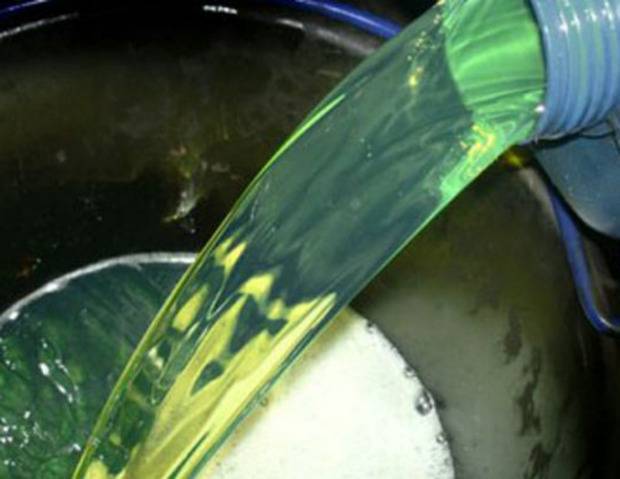

It is also recommended to select the boiler power with a margin, so that the heating equipment runs at maximum power less often. This will extend the life of the device.
Average consumption calculator
It is not so difficult to calculate the nominal gas consumption for the past heating period. You just need to take meter readings on a monthly basis. After the end of the season, add up the monthly readings. Then calculate the arithmetic mean. If you need to find out the nominal values at the design stage of a house, or when choosing an economical, but at the same time effective heating equipment, you will have to use the formula.
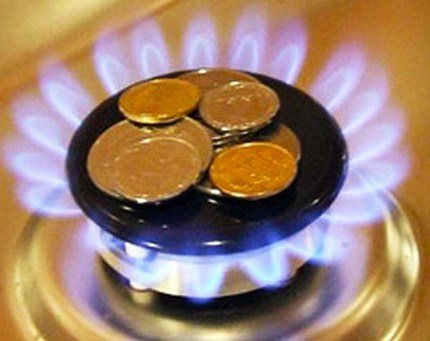

When arranging autonomous heating of a country cottage or apartment, averaged parameters are used when determining heat loss
To obtain approximate calculations, the specific heat consumption is determined in two ways:
- Focusing on the total volume of heated rooms. Depending on the region, 30-40 watts are allocated for heating one cubic meter.
- By the general square of the building. It is based on the fact that 100 watts of heat is spent on heating each square of the area of rooms, the height of the walls in which on average reaches 3 meters.When determining the value, they are also guided by the region of residence: for the southern latitudes - 80 W / kV m., For the northern ones - 200 W / kV m.
The main criterion, which is necessarily guided in the calculations, is the required thermal power to ensure the conditions for high-quality heating of the premises and to replenish its heat losses.
The technological calculations are based on the averaged proportion, at which 1 kW of thermal energy is spent on 10 squares of area. But it should be borne in mind that such an average approach, although convenient, is still not sufficiently capable of reflecting the real conditions of your building, taking into account the climatic region of its location.
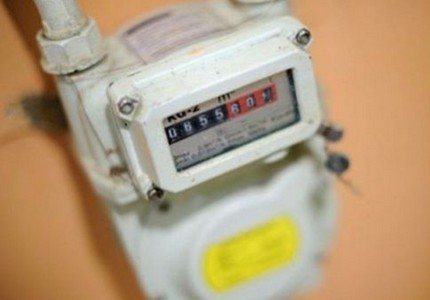

Applying a simplified calculation method, it is taken as a basis that to heat 10 square meters of a private house, 1 kW of heat generated by the generator is required
Having correctly calculated the approximate fuel consumption, you will be able to clarify for yourself what measures should be taken to reduce its consumption. As a result - to reduce the item of regular payments for consumed "blue fuel".
Diesel boiler is profitable for me
I constantly read negative reviews about diesel boilers, and so I want to dissuade everyone. It has been standing at the dacha for many years, problems with it are 0. The house is large, two-storey, with an area of approximately 145 sq. M. in winter, he eats no more than 12 liters per day, while at home Tashkent. A year ago I spent underfloor heating of 3 kW and a couple of converters, each with one kW, and so the fuel consumption was reduced to 6 liters per day. At the same time, on the street, the temperature reaches -25 C. I take fuel on a call, a fuel truck arrives and pours what is needed into the tank, if you take more than 500 liters, then delivery is free.
The boiler is made of steel, with a capacity of about 25 kW, a double-circuit model. We live with our family in the country only on weekends, the house heats up completely in an hour of boiler operation. So I can say with confidence its power is more than sufficient. In general, I am satisfied with the boiler.
+ Pros: Fast warm-up, simple and convenient
- Cons: There are none for me
Device and principle of operation
A diesel boiler is an excellent alternative to any other type of boilers, except for gas ones - no one can compare with them in terms of cheapness and convenience. Running on diesel fuel, they generate heat automatically, requiring little or no user input. By this, they significantly benefit from solid fuel units that cannot live without a person - they need to constantly throw up firewood and remove coal and ash from them.
A diesel boiler can also win over electric heating equipment. First of all, low energy consumption should be highlighted - electricity is used here only for the operation of the burner and the operation of the automation. He does not need powerful electrical wiring, and the monthly expenses "for light" will be relatively modest. And secondly, diesel boilers can operate on other types of liquid fuel. If the power suddenly goes out in the house, they will be able to work on low-power uninterruptible power supplies.
The liquid fuel diesel boiler is distinguished by a relatively simple device - in its design it resembles the most ordinary gas heating unit. The difference lies only in the design of the burner - here it runs on liquid fuel:
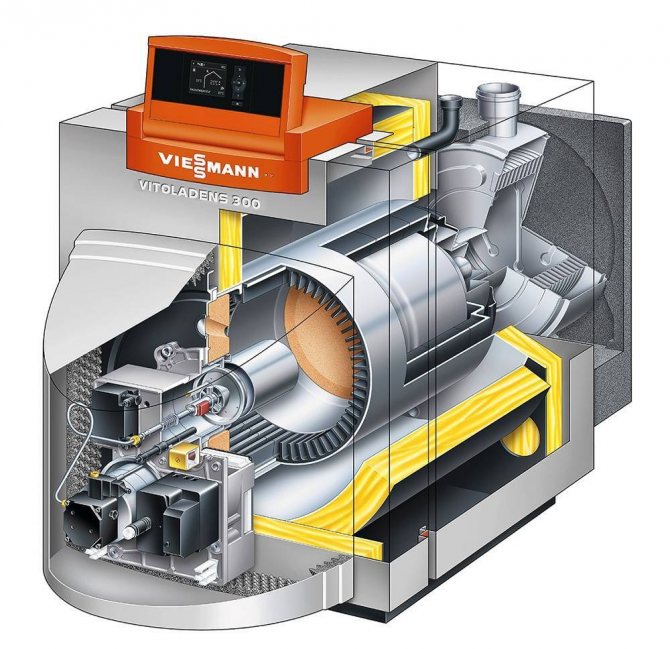

A diesel boiler is a rather complicated unit from a technical point of view. We strongly recommend that you follow the instructions for its operation exactly - otherwise, expensive repairs cannot be avoided.
- The fuel pump delivers fuel to the burner;
- Air is supplied here with the help of a fan;
- A fuel-air mixture is formed, which enters the combustion chamber;
- In the combustion chamber, the fuel mixture ignites and burns with the release of a large amount of thermal energy.
In order to increase productivity, diesel fuel boilers are often equipped with fuel heating systems.
Approximately the same fuel combustion scheme is used in diesel engines, only diesel engines are arranged differently. But the air-fuel mixture is practically the same here.
Let's see what else is there in diesel boilers:
- Main heat exchangers - used for heating the coolant, can be steel or cast iron;
- Secondary heat exchangers - used in double-circuit models for the preparation of hot water;
- Electronic or mechanical control modules - ensure compliance with the temperature regime;
- Insulated Enclosures - Provide safe operation and heat retention.
Also, on board diesel boilers, built-in piping is often installed - this is a safety group, expansion tanks and circulation pumps.
The safety group includes a pressure gauge, an automatic air vent and a safety valve.
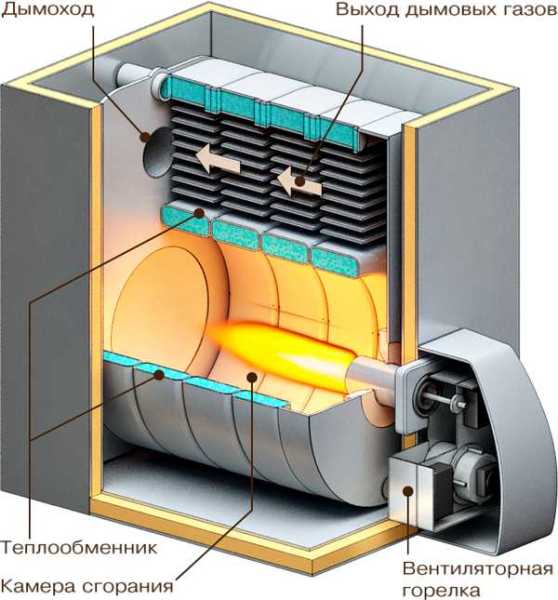

The principle of operation of a diesel boiler is quite simple and very clearly illustrated in the above picture.
Any diesel boiler works in the same way as its gas counterparts - with a command from the control module, the burner ignites, the heating medium starts heating, which continues until the command is given to turn off the burner. In double-circuit models, additional heat exchangers with three-way valves are provided - when the tap with water is opened, the heating circuit is turned off, the hot coolant circulates through the secondary heat exchanger, preparing hot water.
The consumption of a diesel boiler is approximately 1/10 of its thermal power. For example, if the selected model has a power of 24 kW, then it will consume about 2.4-2.5 l / h. The minimum fuel consumption is typical only for the most low-power units - these are typical options for a summer cottage. Heating with diesel fuel cannot be called much more profitable than heating with electricity, but it has its own advantages, which we talked about a little earlier.
In reality, fuel consumption can fluctuate in one direction or another, depending on the design features of the burner and boiler.
Fuel consumption
Diesel boilers require high operating costs. In terms of kW / hour of heat energy produced, diesel fuel is the second most expensive type of fuel after electricity. So that the long-term operation of the boiler does not turn out to be too expensive, it is recommended to purchase equipment with the highest possible efficiency. Condensing equipment is particularly economical.


Regardless of the selected boiler model, the consumption of diesel fuel for heating the house is also determined by external factors, which include:
- the total area and height of the ceilings of the heated rooms;
- the presence or absence of thermal insulation in the house;
- features of the local climate.
Calculations
In order to provide diesel heating for a 200 m2 residential building located in the middle latitude of Russia from mid-autumn to spring, from 4 to 5 thousand liters of diesel fuel will be needed. Taking into account the fact that as of July 2020 a liter of this fuel cost an average of about 34 rubles, the volume of expenses for the heating season will be from 136 to 170 thousand rubles (depending on the boiler performance).
More than 15 thousand rubles will have to be spent on equipment maintenance. You also need to pay for the arrangement of the fuel storage. However, over time, these costs will pay off if the boiler is economical enough.
How to save on fuel Criteria for choosing heating equipment
Units consuming liquid fuel are designed for both one and two circuits. And it is quite obvious that in the second case, the fuel consumption will be large, because of which the costs will only increase.For this reason, the best option for dual-circuit devices may only be to reduce the consumption of hot water consumed, which will help save on fuel.
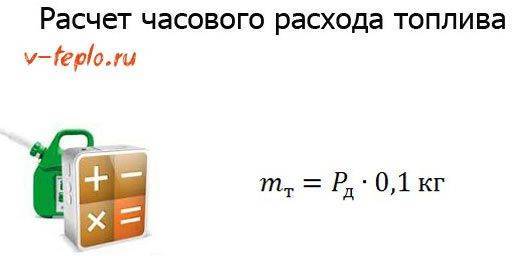

Experts advise one more thing. According to them, it is possible to reduce fuel consumption by setting a lower temperature for the heat carrier. And the final point - it is advisable to install a thermostat in the warmest room. If you follow all these recommendations, you will be able to reduce the consumption of fuel required for the operation of the boiler, and save a certain amount of money.
On many thematic forms, users are interested in: which units are more economical - diesel or electric? And what is the fuel consumption of a diesel heating boiler? It is rather difficult to unequivocally answer this question, since it depends on a number of points, including:
- the quality of the building's thermal insulation;
- the cost of the fuel used;
- area of the heated room;
- features of a specific climatic zone;
- number of residents in the house.
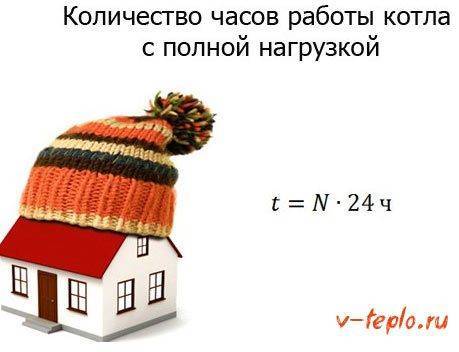

And if you know about all these factors, then you can roughly calculate the consumption of both fuels by comparing costs. And now - a few more practical tips regarding the choice of a heating unit.
- Heating equipment that consumes diesel fuel, in the presence of a combustion chamber made of steel, will be immune to temperature extremes. At the same time, steel undergoes a rusting process, therefore it does not last as long as, for example, cast iron.
- The higher the cost of a heating boiler, the higher the risk that its maintenance will be very expensive for you (when compared with models that have a lower cost).
- Devices that are equipped with a cast iron furnace chamber can last up to twenty years, but temperature drops affect them, moreover, very significantly. In such heating systems it is necessary to install valves that will mix the heated liquid into the "return" line. All this is required so that the combustion chamber does not simply split.
Video - Diesel heating boiler - fuel consumption
https://youtube.com/watch?v=ZRj1PzbcBNs
Why Diesel?
When choosing a heating boiler, each user is guided by specific individual requirements. And if, for example, you live in a settlement where there is no centralized gas supply or there are frequent drops in the supply of electricity, then diesel boilers, the consumption of which, as we have already found out, is insignificant, will be the most optimal option.
Moreover, such devices have one more advantage, which we did not talk about - the fuel tank can be installed in any place convenient for you. And this has become a decisive factor for the fact that the popularity of diesel equipment has only increased recently.
Where does diesel heating begin?
Today, diesel heating in a country house is not a problem. After all, you can find many companies that offer diesel boilers. The efficiency of such boilers is 75-85%. It all depends on what design features the boiler has and what kind of appearance it has. Double-circuit boilers can not only heat the house, but also be used to supply hot water.
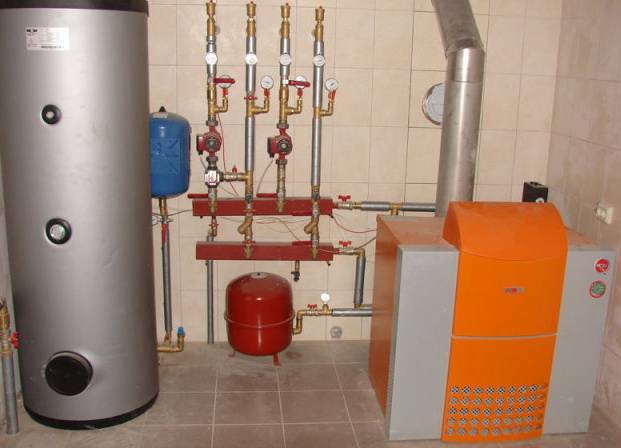

Boiler room of a private house
Of course, first of all, even when choosing a heating system, all home owners have a question - what will be the consumption of diesel fuel for heating a house? Based on statistics, fuel consumption with constant operation is 0.9 liters per hour. Average rates are 0.5-0.7 liters per hour. However, such indicators can be ensured only if your house is very well insulated.
In this case, you can focus on the requirements for gas boiler houses: area from 4 sq. M for each boiler; ceiling height from 2.2 m; doorway from 80 cm; a window of 10 cubic meters by 0.3 square meters of a window; supply ventilation 8 sq. cm per one kW of the rated power of the boiler or 30 sq. cm per 1 kW with air inflow from the internal premises; chimney cross-section not less than the boiler outlet; ground loop bus; channel of natural supply ventilation 30 cm from the ceiling; power supply on a separate machine; diesel fuel for heating - no more than 800 liters in the boiler room.
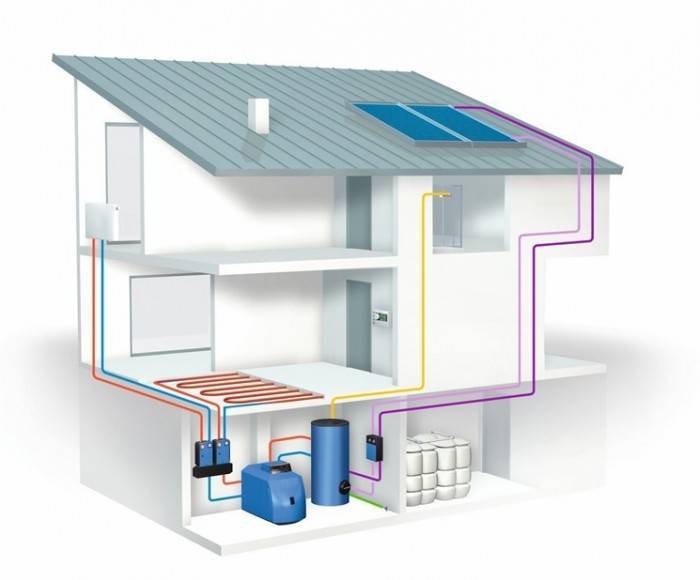

Heating system with a diesel fuel boiler
When you equip a diesel boiler room, you need to pay attention to the fact that you do not need to equip a complex special chimney to work with a turbo burner. You can just buy a coaxial chimney and draw it out through the wall
Thanks to such a pipe, combustion products will be efficiently removed, and clean air will be taken inside.
What is the gas demand during the heating season?
Let's imagine that we need to heat a country house with an area of 150 m2. The first question that arises is - what kind of boiler should be purchased in order to be comfortable in the house on any winter day?
If the construction of a house is just underway, it is necessary to calculate the capabilities of the boiler and heat loss, taking into account the materials of the walls, the height of the ceilings, the quality and size of the windows. But since specialists have already done this and determined that, on average, for every 10 m2 there should be 1 kW of heat generator power with a ceiling height of up to 3 m (it is better if the height does not exceed 2.7 m), then we will use these figures.
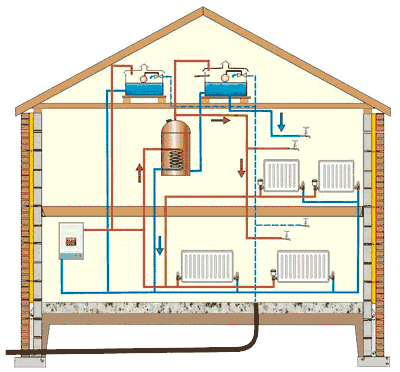

Based on this, for a house of 150 m2, you need to buy a gas boiler with a minimum power of 15 kW. But, since it will most likely work for hot water supply (DHW), then a reserve of 2-3 kW is provided. It is also necessary to take into account that in reality the consumption of heat energy is on average almost half less on average, since during the heating season there are also positive outside air temperatures.
At this time, the rate of gas consumption also changes. Therefore, in our formula for calculating gas, we will substitute a value 2 times less, that is, a house with an area of 150 m2 will consume not 18, but 9 kW / h (15 + 3): 2 = 9. We have decided on the thermal power, and the volume of fuel is calculated according to the formula:
L = Q / (qH x 0.92)
L - gas consumption for 1 hour in cubic meters.
Q - thermal power, kW.
qH is the net calorific value of fuel, the value of which is 10.175 kW / m3 for natural gas.
0.92 - boiler efficiency.
Now we can calculate the gas consumption for 1 hour when heating a house of 150 m2:
L = 9 / (10.175 x 0.92) = 0.96 m3 / hour of natural gas.
Naturally, the volume per day is equal to:
0.96 x 24 = 23.04 m3, and 691.2 m3 per month.
For 1 m2, this will amount to 691.2: 150 = 4.6 m3 of gas.
Using this figure, you can estimate the approximate gas consumption for a house of any size. Knowing the number of days in the heating season and the daily volume, it is possible to calculate the volume of fuel for the entire period of the heating period.
As you can see, the calculations are approximate, but give a complete picture of the required volume of fuel for the heating season, and are quite suitable for the stage of preliminary economic calculation of the heating price. And also for comparison with the efficiency and cost of other heat transfer fluids.
Classification
The choice of the model depends on the set of required characteristics: power, heat exchanger material, type of combustion implemented in the boiler, as well as the need for hot water supply.
Power selection
The most important characteristic, on the correct choice of which the heating efficiency and economical fuel consumption depend. The power of diesel heating equipment is measured in kilowatts, it is indicated in the technical documentation for any boiler. For the calculation, there is a special technique that takes into account all the nuances.
It is more convenient for an ordinary consumer to focus on the area of a heated private house - this indicator is also indicated in the main characteristics of any model. As a rule, for a temperate climate, you can use a simple formula: the total area of all rooms in the house is divided by ten, as a result, the required boiler power is obtained. For colder climates, this value should be increased by 20-30%.
The simplified method for calculating the power is relevant only for houses with a simple layout with a ceiling height of up to 3 m. For multi-storey buildings with heated staircases, it is better to calculate based on the volume of the premises.
Fuel consumption calculation
The consumption of diesel fuel directly depends on the power of the boiler, on average it is calculated as follows: the power of the boiler in kilowatts is divided by 10, the hourly consumption of diesel fuel in kg is obtained in heating mode. In the mode of maintaining the temperature, the consumption is reduced by 30-70%, depending on the degree of thermal insulation of the house.On average, the consumption of household heating boilers in a medium-sized private house is 0.5-0.9 kg.
Heat exchanger material - what depends on it?
The heat exchanger in diesel boilers can be made of steel or cast iron. Both materials have both advantages and disadvantages:
- boilers with a steel heat exchanger are lighter and cheaper, respond faster to temperature changes, are more resistant to local overheating, but they are highly susceptible to corrosion;
- the stainless steel heat exchanger is durable, is not afraid of the effects of aggressive compounds, has a uniform heat distribution, while the price for them is slightly higher;
- the price of boilers with a cast-iron heat exchanger is higher, they are heavier, more fragile and can crack at sudden temperature changes, but they are more resistant to corrosion and durable when used in an aggressive environment;
The combustion of diesel fuel produces large amounts of soot containing sulfur compounds. Combining with condensate, they form weak acids, which leads to rapid corrosion of the boiler elements and its failure.
Condensation can be avoided by using a properly installed return flow system to the boiler, which will be described in the corresponding section.
Single or double circuit?
Diesel boilers for a private house can not only provide heating, but also heat water for domestic needs. Such boilers are called double-circuit. When choosing a double-circuit boiler, it is necessary to increase the design power by 20%, otherwise it may not be enough for efficient heating and water heating.
When buying, you need to evaluate the feasibility of buying a double-circuit model, if the hot water consumption is insignificant, it is better to install a separate water heater and not complicate the heating system.
Heat generation method - which is better?
According to the principle of heating the coolant, diesel boilers are of the traditional type and condensing ones, which additionally use the energy of condensate. They have improved efficiency and lower fuel consumption, but they are more expensive.
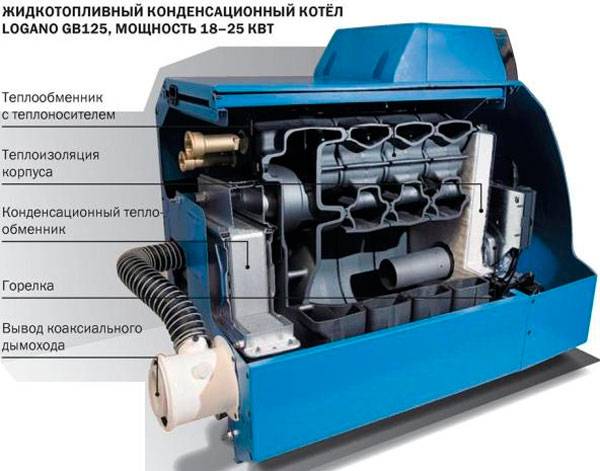

Do I need a replacement torch?
Diesel burners are very similar in design to gas burners, so there are many models on the market that allow you to use any of these burners in one boiler. Replacing them is so simple that it does not require a call to the wizard - you can do it yourself at a convenient time.
If a diesel boiler is purchased as a temporary source of heating, and it is planned to connect to the gas main in the foreseeable future, it is better to choose a model adapted to replaceable burners.
Equipment classification
Depending on the requirements for the equipment, a specific boiler model is selected. Characteristics that are important when selecting a heating boiler:
- power;
- type of combustion;
- heat exchanger material;
- fuel consumption;
- additional possibility of water heating.
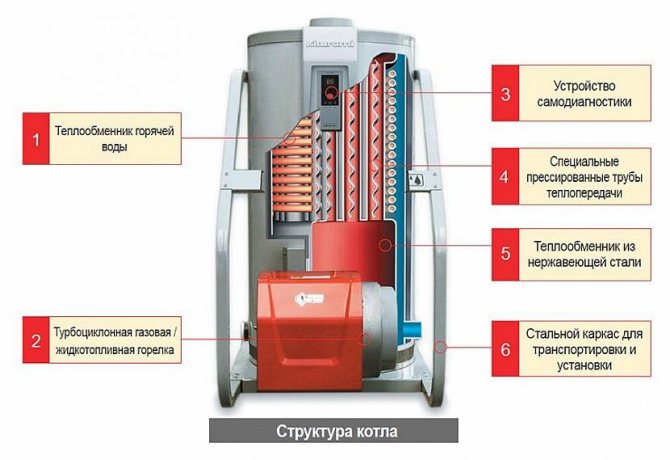

View of the liquid fuel boiler from the inside Source stroyfora.ru
On our website you can find contacts of construction companies that offer a house insulation service. You can communicate directly with representatives by visiting the Low-Rise Country exhibition of houses.
Power
The economy of the consumption of diesel fuel and the efficiency of the unit depend on the power consumption. The generally accepted unit for measuring power is kilowatts. This characteristic is necessarily reflected in the documentation attached to the boiler.
The selection of a model in terms of power must be performed based on the area of the heated room in the house. The calculation of the required power is quite simple: the area of all rooms is summed up, and the resulting amount must be divided by 10. This formula determines the power of the boiler for a house located in a temperate climate.
This calculation method is suitable for rooms where the ceiling height is no more than 3 m.If the building is located in an area with a cold climate, then the calculated capacity of the unit must be increased in the range from 20 to 30%.
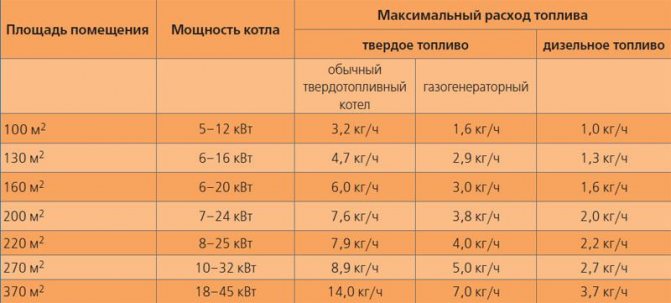

Comparison of the power of boilers of different types in the table Source pechilux.ru
Determination of fuel consumption
Diesel heating of a private house requires a significant consumption of diesel fuel. This indicator depends on the capacity of the boiler equipment. You can calculate the amount of fuel using the formula: the boiler power is divided by 10. The resulting quotient is the hourly fuel consumption (in kilograms) during heating.
Fuel consumption is significantly reduced in temperature hold mode. How economically diesel fuel will be consumed in this case depends on the quality of the building's thermal insulation. With a weak one - a decrease in the volume of consumption will occur by a third, with a good one - up to 70%. Average fuel consumption for a private house is usually between 500 and 900 grams.
Boilers for heating and heating
Diesel boilers can serve not only to heat a house, but also to heat water. Devices that combine both of these functions are called dual-circuit.
If just such an option is needed, the calculated power must be increased by a fifth. This factor should be taken into account immediately. Otherwise, the power of the diesel boiler may not be enough for both water heating and heating.
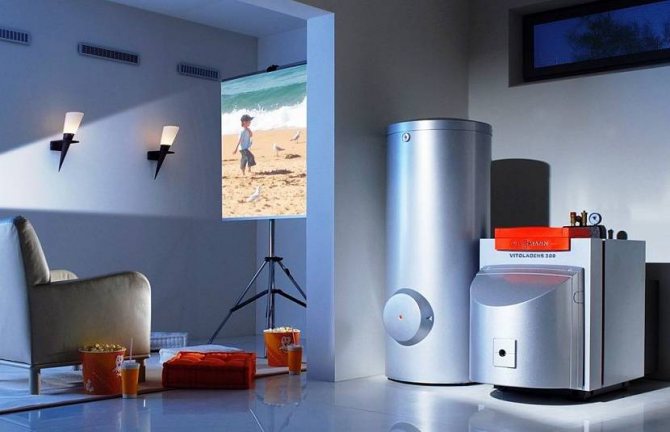

Heating system for home heating and water heating Source teplotehnika.msk.ru
Heat exchanger: choice of material of manufacture
The boiler heat exchanger material is one of the important parameters. In the process of fuel combustion, soot is formed, which, when combined with condensate, leads to corrosion and failure of the unit. Each heat exchanger material has its own strengths and weaknesses, including with respect to resistance to corrosion and temperature extremes.
Cast iron
The cast iron heat exchanger has a higher corrosion resistance compared to steel. But at the same time, it can crack from temperature changes. Cast iron is heavier than steel, its price is higher.
Steel
The steel body is lighter and cheaper than cast iron, it is resistant to temperature extremes, but is susceptible to corrosion. Stainless steel has the best performance. But such a boiler will cost more.
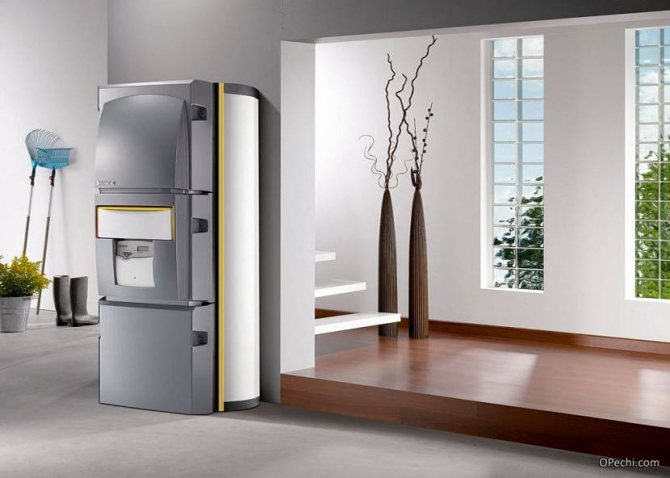

Choosing a diesel boiler, you can build on financial capabilities, but do not forget about the quality and duration of operation. Source happymodern.ru
This might be interesting!
In the article at the following link, read about an electric boiler for heating a private house.
Heating principle
According to the heating principle, diesel boilers are of two types:
- condensing;
- traditional.
Condensation ones are more efficient, since energy from condensate is additionally used. This allows fuel consumption to be more economical. The price for this type of boiler is higher.
How to install a diesel fuel boiler in the country
- The boiler is installed in a well-ventilated, heated room with natural light.
- Tanks for diesel fuel are installed in the boiler room (a reserve fuel supply of no more than 3-5 m3 is allowed), or they are mounted in the ground below the freezing point.
- The connection to the mains is carried out by means of a stabilizer and a UPS, with a capacity sufficient to ensure the autonomous operation of the boiler during the day.
Pros and cons of using a diesel boiler in heating a summer cottage
- Speed and low cost of installation. In the Moscow region, just supplying gas to a country house costs 800,000-120000 rubles. For the installation of a boiler house on diesel fuel, no approvals, design documentation, etc. are required. Immediately after purchase, the boiler is mounted and piping is performed. It will take 1-2 days to install.
- Efficiency - for small rooms, it is realistic to select equipment with low diesel consumption.At the same time, mini boilers are small in size, efficiently heat rooms and have a high degree of automation.
- Noise during operation.
- Limitations associated with the characteristics of diesel fuel.
- The need for regular cleaning of the heat exchanger and chimney.
Requirements for a diesel boiler room in the house
Installing a diesel boiler in a house is a complex technical process that requires qualified assistance. When connecting, take into account the current regulatory requirements and fire safety rules. Adjustment and maintenance are carried out using special computer software.
The organization of heating in a private house with a diesel boiler is carried out in compliance with the following conditions:
- The room for the boiler is chosen from technical rooms with a sufficient area, lighting, ventilation.
- The placement of diesel boilers in residential country houses is carried out on a non-combustible base. Wall and floor decoration is carried out using non-combustible building materials: ceramic tiles, plaster.
- Automation - maintaining the temperature in the house, is carried out in automatic mode. Human participation in the work of the heat generator is minimized. It is imperative that a safety automatics be installed that turns off the operation of the boiler in the event of an emergency.
- Ventilation in the boiler room is provided through channels with natural and forced air supply and air extraction. The section of the ventilation duct is calculated based on the triple air exchange within an hour.
- Diesel fuel storage, installed in a detached building. In the boiler room, storage of a reserve tank is allowed, with a maximum capacity of no more than 3-5 m³.
The correct installation of a diesel boiler in a residential private house is based on an understanding of the working processes. The burner device creates strong noise interference, therefore, soundproof measures are carried out in the boiler room.
Additionally, a UPS and a stabilizer are installed to ensure that the system remains operational, even in the event of power surges or power outages.
Advantages and disadvantages of household diesel boilers
Reviews of diesel heating boilers for private houses and cottages indicate the same problem. A domestic consumer, even if he reads the operating instructions, adjusts the operation of the boiler to suit his needs, violating the manufacturer's recommendations, which is the main reason for malfunctions.
The efficiency of boiler equipment depends on correct operation, starting with precisely adjusted settings and ending with the need for regular maintenance. If the house is properly heated with a diesel boiler, high efficiency and heat transfer rates are observed. Any violations lead to excessive consumption of fuel.
The disadvantages of heaters are:
- Noisy boilers - as a rule, the noise is not audible if the passage to the boiler room is closed by a door. It is not recommended to install a diesel boiler in a kitchen or any room adjacent to living rooms.
- Maintenance cost - you will need to regularly clean the heat exchanger and chimney from accumulated soot. When switching to another type of liquid fuel, as well as before the start of the heating season, burner adjustment is required. The optimal solution that allows you to save money is the conclusion of a contract for permanent maintenance.
The advantages of boilers are low installation costs, quick commissioning, no need for permits and approvals.
The most economical boiler is one installed and operating in accordance with the manufacturer's recommendations. After installation and connection, a company representative will instruct you on how to use the heat generator.
Operating experience shows that following the recommendations is the best way to extend the life of the boiler, to ensure maximum heat transfer and comfortable heating of living quarters.
Calculation of the power and temperature of a warm water floor
Gas consumption calculation
The power of the boiler or convector depends on the heat loss in the building. The average calculation is based on the total area of the house.
When calculating the gas consumption, the heating rates per square meter are taken into account at a ceiling height of up to 3 m:
- in the southern regions, 80 W / m² is taken;
- in the north - up to 200 W / m².
The formulas take into account the total volume of individual rooms and premises in the building. For heating each 1 m³ of the total volume, 30 - 40 W is allocated, depending on the area.
By boiler power


Balloon and natural gas are calculated in different units
The calculation is based on the heating capacity and area. The average consumption rate is applied - 1 kW per 10 m². It should be clarified that it is not the electric power of the boiler that is taken, but the thermal power of the equipment. Often such concepts are substituted, and an incorrect calculation of gas consumption in a private house is obtained.
The volume of natural gas is measured in m³ / h, and liquefied gas - in kg / h. Practice shows that to obtain 1 kW of thermal power, 0.112 m³ / h of the main fuel mixture is consumed.
By quadrature
Specific heat consumption is calculated according to the formula presented if the difference between outdoor and indoor temperatures is approximately 40 ° C.
The ratio V = Q / (g K / 100) is used, where:
- V is the volume of natural gas fuel, m³;
- Q is the thermal power of the equipment, kW;
- g - the lowest calorific value of gas, usually equal to 9.2 kW / m³;
- K is the efficiency of the installation.
Depending on pressure


The amount of gas is recorded by the meter
The volume of gas passing through the pipeline is measured by a meter, and the flow rate is calculated as the difference between the readings at the beginning and end of the path. The measurement depends on the pressure threshold in the converging nozzle.
Rotary counting devices are used to measure pressure over 0.1 MPa, and the difference between outside and inside temperatures is 50 ° C. The gas fuel consumption indicator is read under normal environmental conditions. In industry, proportional conditions are considered to be a pressure of 10 - 320 Pa, a temperature difference of 20 ° C and a relative humidity of 0. Fuel consumption is expressed in m³ / h.
Calculation by diameter


Calculation of the diameter of the pipeline is performed before the start of construction
The gas velocity in a high-pressure gas pipeline depends on the cross-sectional area of the collector and averages 2 - 25 m / s.
The throughput is found by the formula: Q = 0.67 · D² · p, where:
- Q is the gas consumption;
- D - nominal bore diameter of the gas pipeline;
- p is the working pressure in the gas pipe or the absolute pressure of the mixture.
The value of the indicator is influenced by the outside temperature, heating of the mixture, excess pressure, atmospheric characteristics and humidity. The calculation of the diameter of the gas pipeline is done when drawing up the system design.
Taking into account heat loss
To calculate the consumption of the gas mixture, it is required to know the heat losses of the structure.
The formula used is Q = F (T1 - T2) (1 + Σb) n / R, where:
- Q - heat loss;
- F is the area of the insulating layer;
- T1 - outside temperature;
- T2 - internal temperature;
- Σb is the sum of additional heat losses;
- n is the coefficient of the location of the protective layer (in special tables);
- R - resistance to heat transfer (calculated on a case-by-case basis).
Determination of heat loss is a complex calculation and is carried out by specialists at the project stage. You can order the finding of losses at any stage of the operation of the structure.
By counter and without
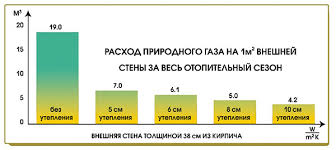

Gas consumption depends on the insulation of the walls and the climatic conditions of the region
The gas consumption per month is determined by the device. Standard mix rates apply if no meter is installed. For each region of the country, the standards are set separately, but on average they are taken at the rate of 9 - 13 m³ per month per person.
The indicator is set by local governments and depends on climatic conditions. The calculation is carried out taking into account the number of owners of the premises and people actually living in the specified living space.
Diesel heating boiler fuel consumption
When deciding to install a diesel heating boiler in your house, fuel consumption is the paramount issue that will naturally concern you.
Moreover, and during operation, how to save on diesel fuel. And at the acquisition stage, what power diesel boiler is needed for your particular cottage and how much fuel it will need for the entire heating season, where and how to store it. All this needs to be solved before organizing the heating of the house with a diesel boiler.
The choice in favor of a diesel boiler is based mainly on its ease of operation, complete autonomy and the absence of the need for any permits during installation. The main problem is to select the correct volume of the fuel tank. In remote areas, you will have to have a large container available, which is filled in advance and then diesel fuel is consumed from it throughout the winter.
For simplicity of calculations, it is conventionally considered - for every 10 m2, about 1 kW of boiler power is needed to maintain a comfortable temperature inside the living quarters. That is, for a cottage of 250 squares, you will need to buy a boiler of at least 25 kW. This figure is also multiplied by a correction factor from 0.6 to 2. Calculated based on the lowest possible levels of winter temperatures and depending on the climatic zone of residence. A decreasing 0.6 for the regions of the south, and an increasing 2 for the far north.
After you have chosen and installed a diesel heating boiler based on the area of the house, fuel consumption can be reduced due to additional insulation of the home. But experts recommend targeting exactly 10: 1 based on the area of the house. Pick up a boiler with a lower power, and even with rare frosts, you can freeze. A small margin of power will not hurt.
Reviews of diesel heating boilers for private houses
1. We decided to purchase a diesel heat generator for heating the country house, since there is no gas supply in the village and is not expected in the near future. The price of a diesel boiler at the time of purchase was about 35 thousand rubles, which is quite commensurate with our budget. I installed the boiler myself and there were no significant difficulties. Now, for two years now, the house is warm and cozy, we are very pleased with the purchase.
2. Since there is no centralized gas supply in our village, we had to look for alternative options. Electric boilers disappeared immediately, since power outages are not uncommon in our country. Of the remaining options, we settled on a Navien LFA 21K double-circuit diesel boiler. As time has shown, the choice was absolutely correct, for 4 years now there have been no problems with heat and hot water.
3. It is very good that when installing a diesel boiler in a house, it is not necessary to equip a special chimney! We installed the unit in a separate annex next to the house, and we brought a sandwich pipe through the wall to the street. The turbine copes well with the removal of gases and we do not feel any unpleasant odors. In terms of performance, the unit provides enough heat and besides, there is no hot water interruption.
4. The year before last, a diesel boiler ACVNmini was installed. In general, there are no significant complaints, unless it makes noise. This year I will make soundproofing from plasterboard with mineral wool lining and then it will be very good.
The use of units operating on liquid fuel as a heat generator is quite justified in the absence of centralized gas supply. In addition, unlike solid fuel boilers, the duration of a diesel boiler in autonomous mode is limited exclusively by the capacity of the fuel tank.
